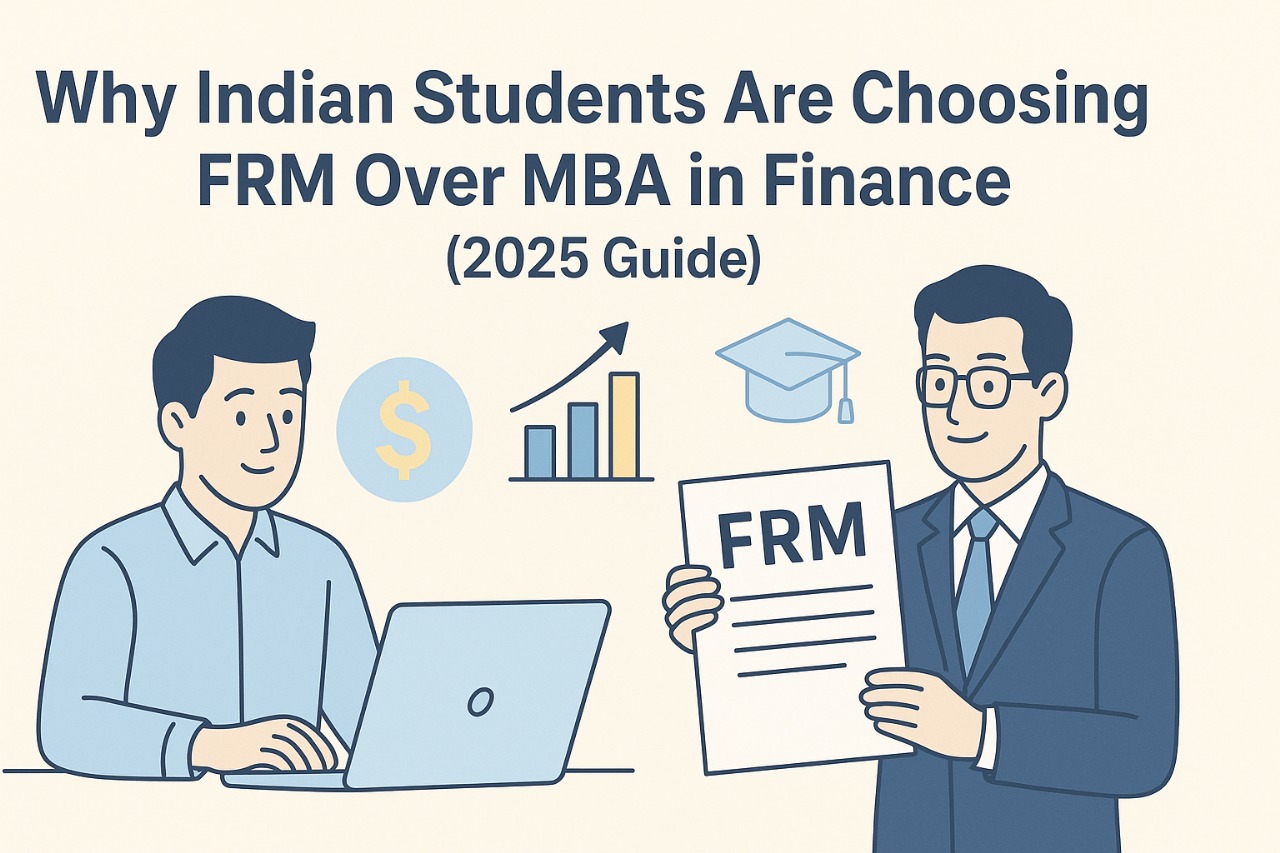
Blog
Why Indian Students Are Choosing FRM Over MBA in Finance (2025 Guide)

Over the last few years, a noticeable shift has emerged in India’s finance education space more students are choosing the Financial Risk Manager (FRM) qualification over an MBA in Finance.
This change isn’t just a trend; it’s a reflection of shifting career demands, salary expectations, and the growing importance of specialized skills in risk management. In this article, we’ll break down FRM vs MBA in Finance, career scope, salary prospects, difficulty levels, and why FRM is becoming the preferred path in 2025.
1. The Growing Appeal of FRM in India
The FRM credential, awarded by GARP, is globally recognized as the gold standard for risk management professionals. Indian employers in banking, fintech, and consulting now actively seek FRM-certified talent due to rising regulatory demands and financial complexities.
Key drivers for FRM’s popularity among Indian students:
- Global Recognition: Accepted in 190+ countries.
- Specialization: Deep focus on market, credit, and operational risk.
- Faster ROI: Lower cost and shorter completion time than most MBA programs.
- High Demand: Growing need for risk professionals in India’s expanding financial sector.
2. FRM vs MBA in Finance: Scope & Opportunities
When it comes to FRM career scope in India, the differences with an MBA are clear:
| Criteria | FRM | MBA in Finance |
|---|---|---|
| Duration | 1-2 years (flexible) | 2 years full-time |
| Cost | ₹1.5-2.5 lakh | ₹8-25 lakh (top B-schools) |
| Focus | Risk management & analytics | Broad finance & management |
| Global Recognition | High | Variable by institute |
| Job Roles | Risk Manager, Credit Analyst, Market Risk Specialist | Financial Analyst, Investment Banker, Corporate Finance |
| Average Salary | ₹8-18 LPA | ₹6-20 LPA (depending on B-school) |
Bottom line:
- MBA offers broader managerial exposure.
- FRM provides deep technical expertise in a niche with growing demand.
3. Salary & ROI: MBA in Finance vs FRM in India
One of the biggest decision points for students is salary versus the cost of education.
- FRM Salary India 2025: Entry-level packages start at ₹8–10 LPA, with experienced professionals earning ₹20+ LPA in top banks and consulting firms.
- MBA in Finance Salary India 2025: Top IIMs and ISB grads may cross ₹25 LPA, but the average for most B-schools is ₹6-12 LPA.
ROI advantage: FRM often delivers a faster return on investment due to its lower cost and quicker completion time.
4. Difficulty Level: FRM vs MBA
- FRM Exam: Two rigorous levels, heavy on quantitative skills and financial concepts. Self-study is friendly but requires disciplined preparation.
- MBA in Finance: Admission depends on CAT/GMAT performance and GD/PI rounds; academic rigor varies by institute.
Students who enjoy analytical problem-solving often find FRM’s structured approach appealing.
5. Benefits of FRM Over MBA for Indian Students
- Global mobility: Easier to work abroad in finance roles.
- Lower cost barrier: Affordable compared to MBA tuition.
- Niche expertise: Risk management is a critical skill in today’s market.
- Flexibility: Can be pursued alongside a job.
6. FRM Demand in India 2025
With the RBI tightening compliance norms and global banks expanding operations in India, FRM-certified professionals are in high demand. Roles in risk, compliance, and treasury are expected to grow by 15-20% in the next three years.
Conclusion: Should You Choose FRM Over MBA in Finance?
If you want specialised expertise, global recognition, and a quicker ROI, FRM is a strong alternative to an MBA in Finance. While an MBA offers broader career options, the FRM path positions you directly in high-demand risk management roles in a sector where India is seeing exponential growth.
If you’re ready to future-proof your finance career, start your FRM journey with expert guidance.
Fintelligents offers India’s leading FRM coaching with proven results, flexible batches, and mentorship from industry professionals.
Explore our FRM Course here and take the first step toward becoming a certified risk professional.
FAQs: FRM vs MBA in Finance
Q1 : Is FRM better than an MBA in Finance?
Ans: If your goal is a career in risk management or related fields, FRM offers more focused and globally recognized expertise than a general MBA.
Q2 : What jobs can I get after FRM in India?
Ans: Common roles include Risk Manager, Credit Risk Analyst, Market Risk Specialist, and Compliance Officer.
Q3 : Can I pursue FRM while working?
Ans: Yes. FRM’s flexible exam schedule allows professionals to prepare without quitting their jobs.
Q4 : Is FRM difficult to pass?
Ans: It’s challenging but achievable with consistent preparation and the right guidance.
Q5 : What is the FRM salary in India in 2025?
Ans: Entry-level salaries start at ₹8-10 LPA, with senior professionals earning ₹20+ LPA.
